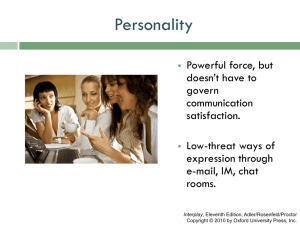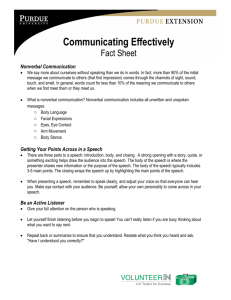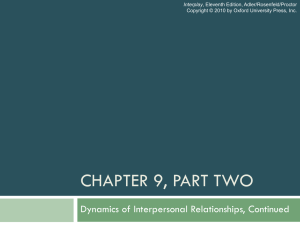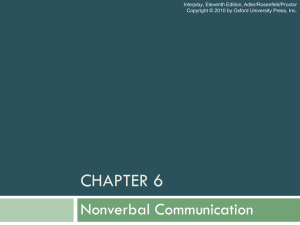ch 6 1318 - HCC Learning Web
advertisement
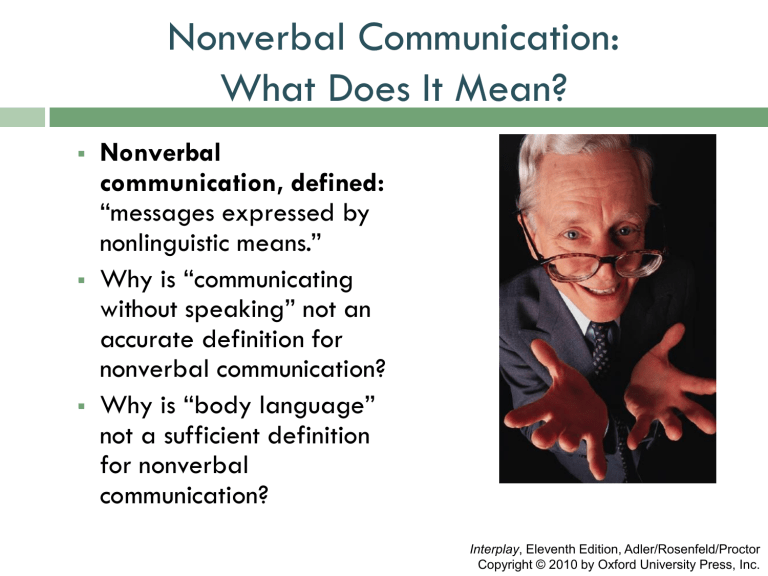
Nonverbal Communication: What Does It Mean? Nonverbal communication, defined: “messages expressed by nonlinguistic means.” Why is “communicating without speaking” not an accurate definition for nonverbal communication? Why is “body language” not a sufficient definition for nonverbal communication? Interplay, Eleventh Edition, Adler/Rosenfeld/Proctor Copyright © 2010 by Oxford University Press, Inc. Research shows… Mehrabian (1972): 93% of emotional impact of a message come from a nonverbal source. Birdwhistell (1970): 65/35 split of actions and words. Social scientists: Nonverbal communication shapes perceptions. Interplay, Eleventh Edition, Adler/Rosenfeld/Proctor Copyright © 2010 by Oxford University Press, Inc. All Behavior Has Communicative Value Discuss your agreement or disagreement with the statement “you cannot not communicate.” Research: We aren’t always conscious of what we and others are communicating nonverbally. Interplay, Eleventh Edition, Adler/Rosenfeld/Proctor Copyright © 2010 by Oxford University Press, Inc. Nonverbal Communication is Primarily Relational Nonverbal communication serves in social function. Defines the relationship we want/have with others. Convey emotions we are unwilling/unable to express or unaware of. How does technology impact the relational aspect of nonverbal communication? Interplay, Eleventh Edition, Adler/Rosenfeld/Proctor Copyright © 2010 by Oxford University Press, Inc. Nonverbal communication is ambiguous. Describe the various interpretations of silence. Research: “Positive nonverbal communication is easier to identify than negative nonverbal communication.” Use perception-checking to clarify others’ nonverbals. Interplay, Eleventh Edition, Adler/Rosenfeld/Proctor Copyright © 2010 by Oxford University Press, Inc. Influencing Others Nonverbal behavior helps us: Capture attention Show or increase liking Generate power Boost credibility What other ways do we use nonverbal communication to influence others? Interplay, Eleventh Edition, Adler/Rosenfeld/Proctor Copyright © 2010 by Oxford University Press, Inc. Managing Identity Nonverbal cues: May be more important than verbal messages in creating impressions. Manner: The way we act, stand and move, control facial expressions, vocal adjustments. Appearance: The way we dress, artifacts we wear, hair, makeup, scents, etc. Setting: Physical items we surround ourselves with i.e., personal belongings, vehicles, place we live. Interplay, Eleventh Edition, Adler/Rosenfeld/Proctor Copyright © 2010 by Oxford University Press, Inc. Touch Haptics: Study of touching. Touch boosts mood, increases liking, improves compliance. Research: “Fleeting touches on hand or forearm can result in larger tips for restaurant servers.” Beware unwanted touching: Concern/legal action. Why do the authors say that the amount of touching decreases with age? Interplay, Eleventh Edition, Adler/Rosenfeld/Proctor Copyright © 2010 by Oxford University Press, Inc. Voice Paralanguage: The way a message is spoken Vocal rate Pronunciation Pitch Tone Volume Emphasis Disfluencies: Reinforce/ contradict message that words convey. What types of paralanguage contradict content? Research: Communicators more likely to comply when speakers have same rate as their own. People often miss vocal nuances of sarcasm. Young children can’t make sense of mixed messages. Interplay, Eleventh Edition, Adler/Rosenfeld/Proctor Copyright © 2010 by Oxford University Press, Inc. Distance Proxemics: How communication is affected by use, organization, and perception of space and distance. We all have a bubble of personal space. Research: Distance = Good indication of prejudices. Edward T. Hall: Intimate distance: Skin contact to 18” Personal distance: 18” to 4’. Social distance: 4’ to 12’. Public distance: 12’ to farthest zone. Interplay, Eleventh Edition, Adler/Rosenfeld/Proctor Copyright © 2010 by Oxford University Press, Inc. Distance What barrier behaviors occur when your “spatial bubble” is invaded? Territoriality: The area that serves as an extension of our physical being. How we respond to breaches of territory depends on who enters, what territory is entered, why they enter, and how they enter. Interplay, Eleventh Edition, Adler/Rosenfeld/Proctor Copyright © 2010 by Oxford University Press, Inc. Time Chronemics: How humans use and structure time. Waiting can be an indicator of status. Use of time is culturallybased, yet rules of time vary within a culture. Rules of time can vary within the same geographic area. Interplay, Eleventh Edition, Adler/Rosenfeld/Proctor Copyright © 2010 by Oxford University Press, Inc.

